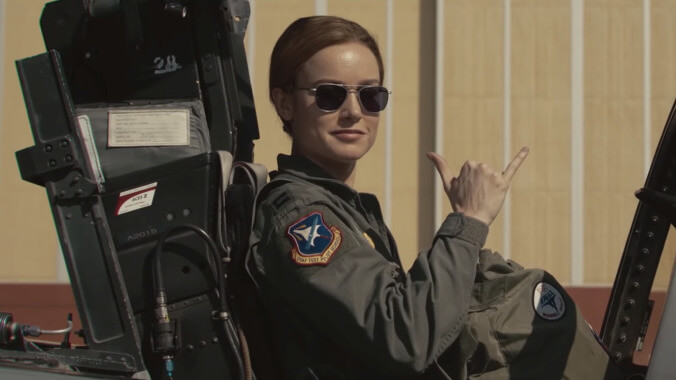Guardians director James Gunn offers explanation for Marvel's military relationship
James Gunn comes to Marvel's defense in regards to their relationship with the Department Of Defense

[This article discusses the plot of Eternals]
James Gunn wants you to know that the military doesn’t approve Marvel scripts—regardless of how many promos Brie Larson did for the Air Force in the run-up to Captain Marvel.
After the embargo lifted on Eternals and reviewers began divulging plot details online, readers shared some of the film’s shocking elements. One moment, in particular, that’s getting a lot of attention involves the character Phastos (Bryan Tyree Henry) taking responsibility for the United States Air Force dropping an atomic bomb on the Japanese city of Hiroshima, killing between 70,000 and 126,000 civilians.
Podcaster Jesse Hawken took umbrage with the scene, referencing Marvel’s relationship with the military. “The gay Eternal assuming responsibility for the atomic bomb being dropped on Hiroshima is even more amazing once you factor in that Marvel scripts are all approved in advance by the Pentagon,” Hawken wrote.
The tweet caught the attention of superhero moviemaker James Gunn, who made two Guardians Of The Galaxy films for Marvel and is currently working on the third. He also made the decidedly anti-military (or at least military critical) The Suicide Squad, but that’s neither here nor there.
“Marvel scripts are not all approved by the Pentagon,” Gunn tweeted. “Where do people come up with this nonsense?”
“When a film uses military assets for free those specific scripts have to get military approval to make sure the military isn’t disparaged,” he continued in follow-up posts. “This is very few films—and, from what I know, the military is pretty loose about it.”
“This is so stupid. The guy said all Marvel movies are pre approved by the military. This isn’t true. Saying some movies in Hollywood get approval in exchange for assets doesn’t make that any less true. I’ve never had a movie get approved by the military.”
These criticisms of Marvel are not new. Hawken points to a 2019 piece in Newsweek, which reported Captain Marvel’s military involvement. In the article, Newsweek quoted a military and veterans affairs website, Task & Purpose, who described the Captain Marvel spot as “the recruiting tool of the Air Force’s dreams.”
The article continues:
In a license agreement with the Department of Defense for Iron Man, Marvel Studios agreed—in exchange for military support—to conform to the “DoD-Approved” draft of the screenplay, loop the Pentagon into the editing process and cast only actors in compliance with “U.S. military physical, age, and grooming standards.” After the movie’s release, Marvel Studios agreed to “mutually beneficial marketing initiatives,” including “encouraging the involvement of recruiters.”
The Pentagon has partnered with Marvel Studios several times since, including on Captain America: The Winter Soldier and Iron Man 2, which included scenes shot on-location at Edwards Air Force Base in California, just like Captain Marvel. For Iron Man 2, the military provided technical advice, locations and up to 60 military personnel to appear in the movie as background extras.
Of course, Gunn doesn’t work on every Marvel film, and his Guardians Of The Galaxy movies take place, appropriately, in distant galaxies. So, it’s fair to assume that his relationship with Marvel in this regard may be a bit different. Nevertheless, we’re all very excited to watch the Marvel superhero Phastos take responsibility for Hiroshima, which we all assume will be very tasteful and respectful.